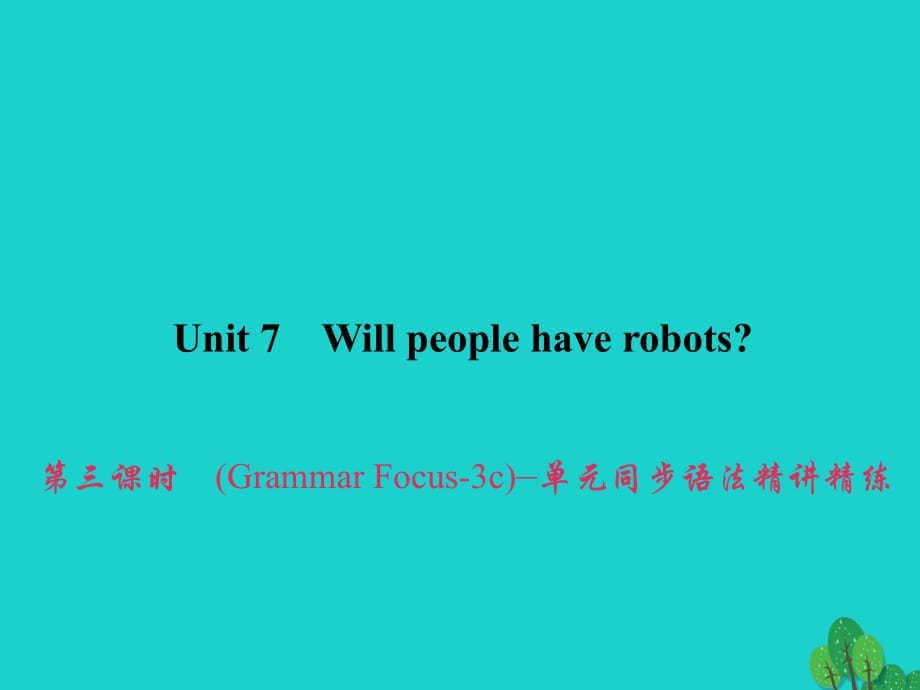《八年級(jí)英語(yǔ)上冊(cè) Unit 7 Will people have robots(第3課時(shí))(Grammar Focus-3c)同步語(yǔ)法精講精練課件 (新版)人教新目標(biāo)版》由會(huì)員分享�����,可在線(xiàn)閱讀,更多相關(guān)《八年級(jí)英語(yǔ)上冊(cè) Unit 7 Will people have robots(第3課時(shí))(Grammar Focus-3c)同步語(yǔ)法精講精練課件 (新版)人教新目標(biāo)版(8頁(yè)珍藏版)》請(qǐng)?jiān)谘b配圖網(wǎng)上搜索�。
1、Unit 7Will people have robots?第三課時(shí)(Grammar Focus3c)單元同步語(yǔ)法精講精練 概念:“will動(dòng)詞原形”表示將來(lái)某個(gè)時(shí)間要發(fā)生的動(dòng)作或存在的狀態(tài)����,也表示將來(lái)經(jīng)常反復(fù)發(fā)生的動(dòng)作,常與表示將來(lái)的時(shí)間狀語(yǔ)連用�����,如tomorrow���, next week, next year�, in the future等。eg:We will come to see you every Sunday.我們將 在 每 周 日 來(lái) 看 望 你 ����。構(gòu)成:肯定句:主語(yǔ)will/shall動(dòng)詞原形其他will用于各種人稱(chēng), shall用于第一人稱(chēng)�����, will在代詞后常縮略為ll����。否
2、定句:主語(yǔ)will/shallnot動(dòng)詞原形其他一般疑問(wèn)句:Will/Shall主語(yǔ)動(dòng)詞原形其他�?特殊疑問(wèn)句:特殊疑問(wèn)詞(組)一般疑問(wèn)句? there be句型的一般將來(lái)時(shí)there be句型的一般將來(lái)時(shí)的構(gòu)成是“There will be主語(yǔ)其他”�,意為“將會(huì)有”。eg:There will be a basketball game tomorrow.明天將會(huì)有一場(chǎng)籃球賽����。其一般疑問(wèn)句形式為“Will there be主語(yǔ)其他?”肯定回答為:Yes����,there will.否定回答為:No, there wont.���。eg:Will there be a basketball game tomo
3��、rrow���?明天會(huì)有一場(chǎng)籃球賽嗎?Yes��, there will.是的,會(huì)有�。/No, there wont.不�,沒(méi)有。否定形式是在will后加not���,即“There wont be主語(yǔ)其他”���,意為“將不會(huì)有”。eg:There wont be a basketball game tomorrow.明天沒(méi)有一場(chǎng)籃球賽����。 特殊疑問(wèn)句形式為“特殊疑問(wèn)詞(組)一般疑問(wèn)句?”�。eg:When will there be a basketball game����?什么時(shí)候會(huì)有一場(chǎng)籃球賽呢? 一�、單項(xiàng)選擇。1 Mr.G reen�����, a famous writer, _ our school next week.A
4����、 visited BvisitsC was visiting Dwill visit2 There isnt any milk to drink, Mom.I _ and buy some.(易錯(cuò)題)A go Bwent Cwill go Dgoing3 I hope Tim can come to my birthday party.Then we _ a much happier time.A have BhadC will have Dare having D C C 4 Why are you walking so quickly�, Edward?There _ a talent sh
5、ow in ten minutes.A will have Bwill beC is going to have Dare going to be5 My sister _ at my uncles home when she _ to London.(易錯(cuò)題)A will stay����;will get Bstays;getsC stays�����;will get Dwill stay�;getsB D 二、按要求完成下列句子�����。6 Well go swimming this afternoon.(改為否定句)We _ _ swimming this afternoon.7 Tom will watch
6�����、a soccer game this Saturday.(改為一般疑問(wèn)句并作肯定回答)_ Tom _a soccer game this Saturday?Yes, _ _8 The students will go_on_a_trip in three days.(對(duì)畫(huà)線(xiàn)部分提問(wèn))_ _the students _ in three days?9 There will be more trees in this place.(改為一般疑問(wèn)句)_ _ _ more trees in this place?wont goWill watchhe willWhat will doWill ther
7����、e be 本課時(shí)其他知識(shí)點(diǎn)精講精練 peace名詞,意為“和平”�。【拓展】in peace平靜地�����;和平地eg:We all hope we can live in peace.我們都 希 望 我們能 和 平 地 生 活 �。peaceful形容詞,意為“和平的��;平靜的”����。sky名詞,意為“天空”�����。用作復(fù)數(shù)skies����,表示天氣或某地的天空看上去怎樣;用作單數(shù)�����,只表示“天空”��。1 They hope the talk will bring _(和平) to Southeast Asia.2 Last year they _ (建造) three tall buildings in the town.3 Its nice to swim in the _ in the hot weather.4 Look����!There are many beautiful clouds in the _peacebuilt sea sky
 八年級(jí)英語(yǔ)上冊(cè) Unit 7 Will people have robots(第3課時(shí))(Grammar Focus-3c)同步語(yǔ)法精講精練課件 (新版)人教新目標(biāo)版
八年級(jí)英語(yǔ)上冊(cè) Unit 7 Will people have robots(第3課時(shí))(Grammar Focus-3c)同步語(yǔ)法精講精練課件 (新版)人教新目標(biāo)版

